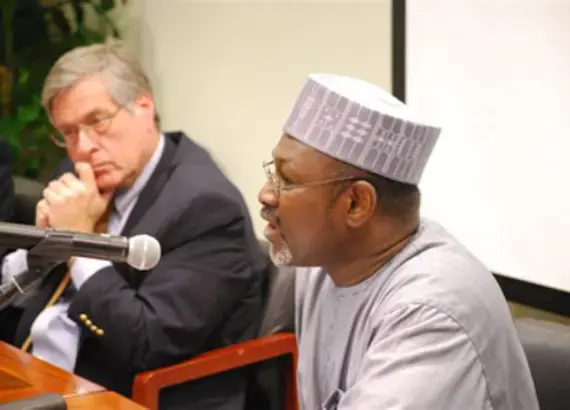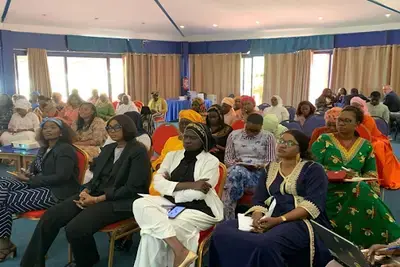
Success Story
Election Commission Chair Pledges Best Effort to Improve 2011 Nigeria Elections
Conducting credible elections in Nigeria will not be easy, but delivering vast improvements over past elections is vital to the country's democratic development, the chairman of Nigeria's independent electoral commission told an audience at NDI on Dec. 6.
"In the past two years a consensus has emerged in Nigeria — for perhaps the first time on any national issue — about the need to have credible elections," said Professor Attahiru Jega, chairman of the Independent National Electoral Commission (INEC) of Nigeria. "It would be a fundamental, major step in the direction of addressing the crisis of government and leadership."
Presidential, legislative and regional elections scheduled for April 2011 follow a string of polls over the past 10 years in which each election has been less credible than the previous one.
A legacy of electoral fraud, political violence and stalled democratic development has marred the past decade of civilian rule in the country. But the appointment of Jega, the former vice chancellor of Bayero University, as chairman of the INEC last June raised expectations about institutional reforms within INEC and significant improvements in the management of the electoral process.
"This the first time in more than a decade [that] hope has replaced pessimism regarding this upcoming election," NDI President Kenneth Wollack told Jega at the event. "Much of the hope is due to your leadership and commitment."
Jega said that the first challenge for INEC is the voter registration process, which will take place Jan. 15-29, 2011. The country faces the enormous challenge of registering an estimated 70 million voters in just two weeks. But Jega said that INEC has learned from past mistakes and is determined to correct them. Jega cited a short video INEC produced in local languages to educate citizens on the registration process as well as the creation of a "situation room," where commission members will be able to monitor registration and voting processes in real time. INEC is also working to produce an interactive map of all polling stations for publication on the commission's website. This is a significant improvement over the 2007 elections, when unreliable information on polling locations led to widespread confusion and the disenfranchisement of voters.
"We know on a daily basis what we must do, what milestones we must hit, where we're falling behind and how to catch up," Jega said. The commission is also working on revalidating a code of conduct for political parties that was largely ignored in the 2007 elections; developing more secure and dependable software for registration; and publishing election day guidelines for groups from poll watchers to security personnel.
Finally, Jega emphasized the importance of successfully prosecuting electoral offenders. While he said he is determined to have every Nigerian's vote count, Jega said the commission is prepared to cancel results from polling stations where serious violence and fraud have taken place. He stated that INEC is committed to working with security agencies in prosecuting electoral offenders.
The event was co-sponsored by NDI, the International Foundation for Electoral Systems (IFES) and the International Republican Institute (IRI). IFES, IRI and NDI are working in collaboration with Nigerian partners to help enhance the credibility of the 2011 elections.
Related:
Pictured above: Professor Attahiru Jega
Published December 8, 2010



